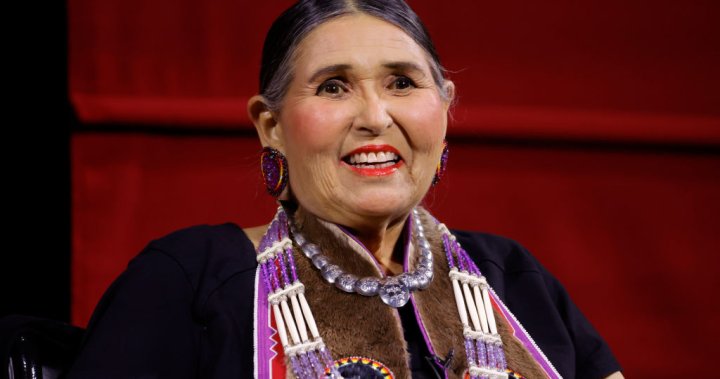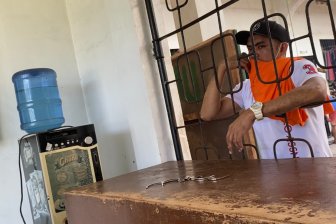Three weeks after the death of Sacheen Littlefeather, a report has emerged claiming that the activist and actor lied about her Indigenous ancestry, sparking controversy among Indigenous critics who say the report’s author is instigating a “witch hunt” and sullying Littlefeather’s legacy.
The report also comes four months after the Academy of Motion Picture Arts & Sciences sent Littlefeather an apology for the way she was treated at the 1973 Oscars, when she famously declined the Best Actor award on Marlon Brando’s behalf as an act of protest against Hollywood’s racist portrayal of Indigenous people.
Littlefeather, who was just 26 at the time, faced threats of violence and was blacklisted from Hollywood following the stunt, she said.
Read more:
Sacheen Littlefeather, who declined Marlon Brando’s Oscar, dies at 75
Read More
But an opinion piece published on Saturday in the San Fransisco Chronicle contends that Littlefeather is an “ethnic fraud” that posed as Indigenous despite having no connection to an Indigenous nation.
Littlefeather’s sister Trudy Orlandi told the Chronicle, “It’s a lie. My father was who he was. His family came from Mexico. And my dad was born in Oxnard [California].”
Rosalind Cruz, another of Littlefeather’s sisters, said, “It is a fraud. It’s disgusting to the heritage of the tribal people. And it’s just… insulting to my parents.”
Littlefeather was born in Arizona to Manuel Ybarra Cruz and Gertrude Barnitz. Her birth name was Maria Louise Cruz.
The author of the article, Jacqueline Keeler, who is also Indigenous, reviewed Littlefeather’s father’s ancestry, where Littlefeather claimed Indigenous heritage, and found no formal ties to Indigenous nations in the U.S. Keeler says she went through immigration documents that showed Littlefeather’s family identified as Caucasian and Mexican when they crossed the Mexican border into the U.S.
Due to assimilation policies in Canada and the U.S., not every Indigenous person is listed as a First Nation member or has concrete documentation to show their affiliation with a specific community.
There are often strict requirements that people must meet in order to gain citizenship to an Indigenous nation — requirements that may not accurately reflect the realities of Indigenous identity. For instance, in the U.S. the “blood quantum” measurement system is used to determine if someone has enough Indigenous “blood” to claim status, and has been criticized as a way to control and erase Indigenous peoples.
Keeler’s article has drawn significant backlash from Indigenous critics who accuse her of harassment and policing Native identity with colonial tactics. Keeler herself is a controversial writer in Indigenous circles for creating and maintaining a list of Indigenous figures she deems “Pretendians” — people who claim heritage with no real Indigenous ancestry.
“I hate that Native people have to spend a single breath talking about Jacqueline Keeler,” Anishinaabe writer Ashley Fairbanks said on Twitter. “There’s so many things hurting our communities, and there’s so many beautiful things to celebrate, and her witch hunt sucks up all the oxygen.”
She added: “It’s up to people’s home community, or the one they claim, to speak out if they feel they’re being harmed. Using tribal enrolment as the only measure of Native identity is so colonial.”
Laura Clark, a deputy editor at Yahoo who is Cherokee, wrote for Variety that “some Natives have had their tribes nearly erased to the point that organized citizenship records simply don’t exist.”
Littlefeather, who died on Oct. 2 of breast cancer, claimed heritage from the White Mountain Apache, a tribe in Arizona, and the Yaqui, whose people can be found in Arizona and the Mexican state of Sonara.
“It’s a mess, this Native life,” Clark adds. “And for a reporter to go after a deceased woman who was just honoured for her contributions to Native American existence, who claimed the Yaqui Nation — a tribe that has fought extinction, partly by moving from its origins in Mexico to Arizona — has understandably riled up a community that feels constantly threatened by erasure and genocide.”
Twitter user CarlyMButton, who identified herself as Yaqui, wrote that “The trouble with Yaqui history is that we were so nearly wiped out by colonization, we don’t have clear knowledge of our ancestry/culture. Any crumbs we get are like the pearls our ancestors dove for & we’re often invalidated by Natives who’re lucky enough to have a whole necklace.”
Littlefeather’s sister also disputed the actor’s claims of coming from an impoverished, abusive family. Both her sisters learned about Littlefeather’s death through the internet and neither were invited to her funeral.
Littlefeather was a longtime activist who organized for the civil rights of Indigenous people in America. Her protest at the Oscars drew attention to the 1973 standoff at Wounded Knee.
She participated in the occupation of Alcatraz in 1970, and she is credited with co-founding the American Indian Registry for Performing Arts and the Red Earth Indian Theatre Company.
© 2022 Global News, a division of Corus Entertainment Inc.





